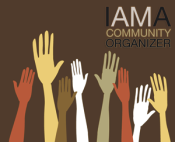I’m starting to be concerned…everyone keeps telling me that people in Indiana are friendly…the hairstylist told me (and she was friendly!), the teachers tell me (oh you’ll like it here, people are so friendly), and I see other folks chatting and waving to each other from time to time…but so far, I am invisible. When I’m out walking on the neighborhood path, I receive not a word of acknowledgment. No smile. No wave. No nod. Nothing.Since I did not make an effort to determine the skin color of the blogger, I am somewhat more able to to respond in a generic fashion that includes the possibility, but does not assume the fact, of skin color-aroused ideation, emotions and behavior toward the blogger asking the question.
Y’all know being friendly requires some outward sign, right?
Or is friendly somehow different here?
Indiana is confusing.
The blogger also posed the question, in the blogs header,
"When is white not white?"I answer these questions together, below, to the best of my indubitable ability, by posing some questions and giving some well-considered responses that I have synthesized during the last ten minutes based on a lifetime of thinking about this:
First, what is the color of your skin? The US Census Quick Facts say that Indiana is 87.8% white and 9.2% Black. If all whites treat each other with friendliness, then perhaps 87% of Indianans and the whites who visit them will report that the state is very friendly. That is a lot of friendliness, indeed. But, whites might have told each other the same thing about Mississippi during slavery. From the perspective of other whites, Mississippi was probably pretty friendly during slavery.
I suggest that you ask some Black people whether the white majority in Indiana is friendly to Black people, because that's the relevant question for anyone with brown skin.
I would also note that although there are 9.2% Blacks in Indiana, including in cities like Gary, IN, you might well travel outside a city with a large Black population and see no Blacks at all in the surrounding suburbs. You might well find that Blacks in Gary have a different opinion about the friendliness shown to Blacks, both in Gary and in the surrounding suburbs, and of other parts of the state, based on their travels and personal experiences.
In 2008, Indiana's Democratic Party Primary voters were fairly friendly to presidential primary candidate and Senator Barack Obama, even though he has brown skin and is regarded as "Black" by many people:
INDIANA RESULTS - 99% ReportingAlthough President Obama did not win the primary, he found the favor of 49% of its voters in the Democratic Party Primary. The General Election results are even more in favor of Obama, showing that Obama beat McCain 50% - 49% in the general election, which presumably would have included more whites, since Republicans, too, were participating. Judging by the 2008 presidential election results, Indiana would appear to be at least half-friendly to half-Black non-whites.
Clinton
638,192
51%
Obama
615,753
49%
Voting to send a world-famous half-Black man to Washington as President may be a different matter from waving to and saying "hello" to an anonymous Black person on the streets of Indiana. Never having spent any time there, I cannot offer a personal opinion. That's probably just as well, because it forces me to look at more objective indicators of Indianans behavior toward Blacks.
I was just reading the US Government's definition of "disability" and one of the requirements is "being regarded as having such an impairment." Likewise, you ask above, "When is white not white?" White is not white when a person "is not regarded as having such an impairment" as the impairment in the United States associated with having skin that is not white.
If relevant professionals, friends, family and neighbors do not regard you as "blind", then you are not disabled by blindness under the US Government's definition of "disability." Likewise, you are not other than white if you are not "regarded as having such an impairment" as being other than white.
In fact, if you know or suspect that you are "one drop" Black, but no one in your community knows about it, you could still have many psychological problems associated with this dual identity. But, can you file a discrimination suit against your employer based on skin color or "race" (sic) if your employer doesn't regard you as someone having other than Black skin?
Maybe you can, because if white people around you say derogatory things about Black people in your presence and generally behave like members of the Knights of the Klu Klux Klan, you can be offended by this even though others do not know that you are a member of the group which they express a desire to completely annihilate.
If you are disabled by a physical impairment that others can perceive, then you may be disabled. Likewise, if you are sociologically, socially, economically or physically impaired among whites as a result of their perception of your skin color e.g. at work, then maybe you're not a white person. At least they don't think you are and they treated you accordingly.
If people don't "treat you accordingly", i.e. as other than white, then you are getting many of the benefits associated with white privilege. THIS DOES NOT MEAN that you are free of the psychological burdens and impairments often associated with knowing that you are "one drop" Black and knowing that some whites would hate and discriminate against you if they were aware of this fact, while Blacks resent you for the special treatment you are being accorded as a result of whites perception that you are not (or are not entirely) Black.
One of the reasons that Barack Obama is not white, is simply the practical fact and the effects of the fact that he is not regarded as being white. He does not get the privileges of being white that come with "generally being regarded as" being white.
You're mother might be black is coal, but you are not entirely other than white until and unless others "regard you as having such" a condition of being other than white. That's just ONE of MANY criteria, but it's a pretty important one. If no one in your neighborhood and none of the doctors you see regards you as "blind" or "vision impaired", how have you managed to keep it a secret?
The disability statute supposes that it is impossible to keep disability a secret from everyone you know; if, you have an impairment serious enough to be eligible for disability benefits, then relevant people will know about it. If they don't know, it's because your impairment, if you have one at all, does not rise to the level required for a finding of disability.
Maybe another useful question is, "When are you impaired by not being white?" Obviously there is no one answer to this question because there are many possible criteria, but there are some obvious answers, such as, "You are impaired by not being white when others perceive you as not being white."



No comments:
Post a Comment